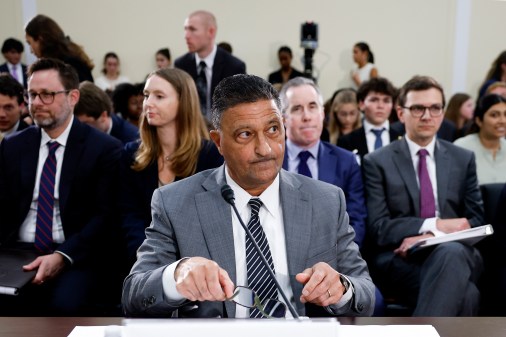Privacy group sues feds over talks with tech companies on ICE raid trackers

A digital privacy group is suing the federal government to obtain records of its communications with technology and social media companies leading up to the removal of several apps and websites that were tracking the activities of Immigration and Customs Enforcement and other agencies.
In a lawsuit filed Thursday, the non-profit Electronic Frontier Foundation names four federal agencies (The Departments of Justice and Homeland Security and component agencies ICE and Customs and Border Patrol) as defendants, seeking their communications with Meta, Apple and Google.
The conversations concern the removal of apps like ICEBlock, Red Dot and DeICER from their respective stores, as well as the removal of websites like ICE Sightings-Chicagoland, which provide real-time online tracking of federal immigration raids.
“The government’s actions are the subject of intense media attention and raise important legal questions,” EFF stated in its complaint. “Documenting law enforcement activities occurring in public and disseminating that information to the broader public is protected First Amendment activity.”
The lawsuit states that Apple removed ICEBlock on Oct. 2 partly because of information it had received from “law enforcement.” Apple officials also cited Attorney General Pam Bondi, who said that Justice “reached out to Apple today demanding they remove the ICEBlock app from their App store – and Apple did so.”
Similar actions, like Meta’s Oct. 14 takedown of a website focused on ICE raids in Chicago, were also confirmed to be at the behest of the government, according to public statements on X by Bondi and other U.S. officials.
EFF argued that these activities clearly fall under free speech and seek records on what kind of conversations these agencies were having with private companies and whether they crossed the line into jawboning.
“Government officials’ coercion to restrict the First Amendment activities of a private party such as a law enforcement tracking application or website can violate the First Amendment,” the complaint stated. “The nature and content of the Defendants’ communications with these technology companies is thus critical for determining whether they crossed the line from governmental cajoling to unconstitutional coercion.”
Throughout the 2024 presidential campaign, Trump and the GOP made the Biden administration’s conversations with social media companies the centerpiece in a broader argument that the administration was violating the free speech rights of Americans.
Google told the House Judiciary Committee this year that it felt pressured by the government to censor certain viewpoints. However, Google and other social media companies have described the exchanges in court cases as entirely voluntary and limited to sharing information about accounts spreading misinformation on COVID-19 and elections. Last year, the Supreme Court found these exchanges were voluntary and that companies could refuse the government’s requests without facing consequences.
On his first day re-entering office, Trump signed an executive order titled “Restoring Freedom of Speech and Ending Federal Censorship” that prevented federal agencies from using time, money or resources on activity that “engages in or facilitates any conduct that would unconstitutionally abridge the free speech of any American citizen.”
EFF filed requests under the Freedom of Information Act at all four agencies, asking for expedited processing due to “the urgency to inform the public about potential coercion of technology platforms and because it is a matter of exceptional media interest that raises questions about the agencies’ integrity.” None have responded with the records.






